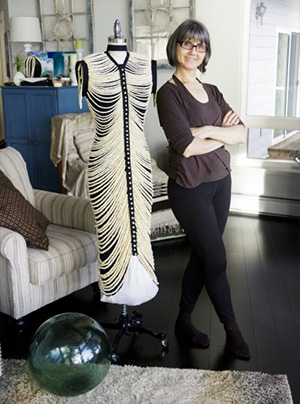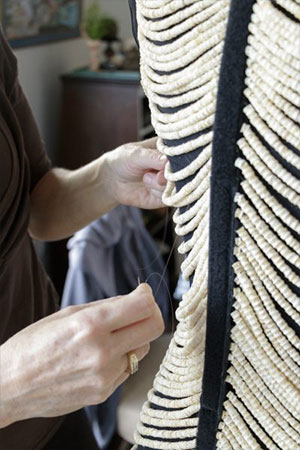
Salmon bones inspire wearable art, new museum pieceBy THERESA BAKKER
December 11, 2017
For Sitka artist Cynthia Gibson, the sight of a fish carcass and a glimpse of its curved backbone on a local beach sparked a vision she carried with her for years. “The simple lines of the bone in its natural setting were beautiful to me,” she said. “I have been using salmon bones for years to embellish corsets and create earrings and other jewelry. Even a flapper dress where the fringe was made up with mostly salmon bones.” Then she decided to make a dress entirely out of bones. The positive feedback from her other experiences, coupled with a desire to challenge herself, led to a unique idea that would take her more than four years to finish. The result is a dress that is now part of the permanent collection at the University of Alaska Museum of the North. Fashion statement Fashion from the 1920s has always been a passion, but Gibson knew she wanted a dress that would elicit that vibe while mimicking the shape of the salmon vertebra she fell in love with on the beach. “With a natural hole in each bone from the spinal cord, stringing them together was easy.” She just had to get them as white as possible. That meant gathering bones from the beach and from others willing to donate. Then sorting and sanding and cleaning and bleaching. Each tiny bead had to be perfect so it could be attached to a little black dress she purchased at a thrift store. She spent hours threading those bones, approximately 20,000 of them altogether. Through trial and error, she strung and sewed and re-sewed many strands. Toward the end of her process, Gibson stopped cooking for her family, snacking in the work space that took up the entire dining room table instead. Her daughter and husband had to fend for themselves, eating frozen pizza and bowls of cereal on the couch. One memory has her sitting at the table in sweats, hair pulled back into a ponytail, stringing bones and eating from a dry bowl of granola. “They both looked at me with big eyes and asked if I was eating the bones! The funny part is that I did almost eat one a few times, my fingers dipping into the bowl of bones next to my granola snack,” she said. Gibson said Alaskans are passionate about wild salmon. It’s a way of life and a livelihood for many generations. And wild salmon stocks are good for the environment. “To my surprise, the dress ended up creating a bridge between art and community. It’s exciting that so many people are inspired by it and that it has a life that doesn’t include a box in my attic.” Historical reference Angela Linn, the senior collections manager of ethnology and history at the University of Alaska Museum of the North, thought the dress was special enough to warrant applying for a Rasmuson Foundation Art Acquisition Grant. This program managed by Museums Alaska is the only source of funding available to the museum for purchasing contemporary cultural items. “It allows us to collect in a timely way the modern aesthetic expressions of Alaska’s living artists,” Linn said. “Without this program, we would have to find a donor willing to purchase the dress and donate it to the museum. This takes a lot of work, especially when your museum has competing needs for fundraising.” Linn said the piece itself is of interest for several reasons. It is a beautiful and compelling interpretation of the importance of salmon to the state. It also communicates a clear sense of place for a resident artist of Southeast Alaska. And as a piece of wearable art, Linn said it fills a hole in the collections plan for the museum’s ethnology and history department, which seeks to represent the experiences of both indigenous people and non-Native residents. “Our institutional mission guides us to collect items to understand local and global concerns. The story of salmon in Alaska as conveyed by this dress has many such implications. While we have a sizable number of formal evening gowns, we currently have no examples of wearable art in the history collection, though the ethnological collection includes many examples of what could be considered wearable art in the form of traditional skin-sewn garments.” The dress in the press Although the dress was not selected for its intended destination, the World of Wearable Art Show in New Zealand — the largest wearable art show in the world — Gibson was glad for the opportunity to refine her creation. “I was determined to make the dress as perfect as possible because it was starting to get legs.” First, a photographer from the Salmon Project shared photos on social media. Then the dress made a trip to the Lower 48, for a temporary exhibit at the Coos Art Museum in Coos Bay, Oregon. And then the reporters started to call. Cosmopolitan Magazine and the online site Salon commended the artist for her imagination and use of unconventional materials. One writer said, “Cynthia Gibson is a name we hope to hear more from very soon. That’s because the Sitka, Alaska, artist just created one of the most memorable avant-garde dresses of 2017.” The review went on to praise her for taking the most revered fish in Alaska and turning it into revolutionary fashion. “I hope that people who see the dress will be inspired and that it will help them open their eyes to limiting beliefs,” Gibson said. “I hope it challenges them to try something audacious and outlandish. I also hope that people appreciate the simple beauty of a salmon vertebrae and that they are able to look at the natural world with more appreciation of using the things we think of as trash.” Though visitors to the museum might be surprised at the creative use of dead salmon in its newest acquisition, the real shock might be in learning what Gibson does for a living. She’s a financial advisor, a numbers person. And while she says most people don’t think of the financial arts as a creative endeavor, the skill is a necessary one. “Albert Einstein said the greatest skill was creativity, which enables you to find new solutions to old problems,” she said. “I feel it helps me to notice detail. I am constantly collecting a jumbled mess and creating order out of it, whether I’m creating a financial plan or a salmon bone dress.”
Representations of fact and opinions in comments posted are solely those of the individual posters and do not represent the opinions of Sitnews.
|
||||

